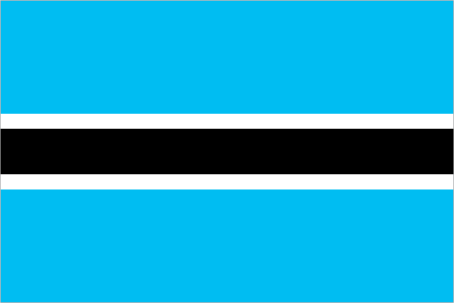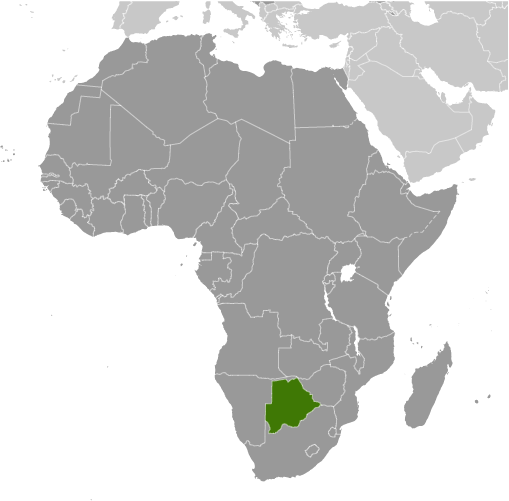Formerly the British protectorate of Bechuanaland, Botswana adopted its new name upon independence in 1966. Four decades of uninterrupted civilian leadership, progressive social policies, and significant capital investment have created one of the most dynamic economies in Africa. Mineral extraction, principally diamond mining, dominates economic activity, though tourism is a growing sector due to the country's conservation practices and extensive nature preserves. Botswana has one of the world's highest known rates of HIV/AIDS infection, but also one of Africa's most progressive and comprehensive programs for dealing with the disease.
Population
2,029,307
Country comparison to the world:144
note:estimates for this country explicitly take into account the effects of excess mortality due to AIDS; this can result in lower life expectancy, higher infant mortality, higher death rates, lower population growth rates, and changes in the distribution of population by age and sex than would otherwise be expected (July 2010 est.)
Nationality
Noun:Motswana (singular), Batswana (plural)
Adjective:Motswana (singular), Batswana (plural)
Ethnic groups
Tswana (or Setswana) 79%, Kalanga 11%, Basarwa 3%, other, including Kgalagadi and white 7%
Religions
Christian 71.6%, Badimo 6%, other 1.4%, unspecified 0.4%, none 20.6% (2001 census)
Languages
Setswana 78.2%, Kalanga 7.9%, Sekgalagadi 2.8%, English 2.1% (official), other 8.6%, unspecified 0.4% (2001 census)
Country Name
Conventional long form:Republic of Botswana
Conventional short form:Botswana
Local long form:Republic of Botswana
Local short form:Botswana
Former:Bechuanaland
Government Type
parliamentary republic
Capital
Name:Gaborone
Geographic coordinates:24 45 S, 25 55 E
Time difference: UTC+2 (7 hours ahead of Washington, DC during Standard Time)
Administrative divisions
9 districts and 5 town councils*; Central, Francistown*, Gaborone*, Ghanzi, Jwaneng*, Kgalagadi, Kgatleng, Kweneng, Lobatse*, Northeast, Northwest, Selebi-Pikwe*, Southeast, Southern
Independence
30 September 1966 (from the UK)
National Holiday
Independence Day (Botswana Day), 30 September (1966)
Constitution
March 1965; effective 30 September 1966
Legal system
based on Roman-Dutch law and local customary law; judicial review limited to matters of interpretation; accepts compulsory ICJ jurisdiction with reservations
Suffrage
18 years of age; universal
Executive branch
Chief of state:President Seretse Khama Ian KHAMA (since 1 April 2008); Vice President Mompati MERAFHE (since 1 April 2008); note - the president is both the chief of state and head of government
Head of government: President Seretse Khama Ian KHAMA (since 1 April 2008); Vice President Mompati MERAFHE (since 1 April 2008)
Cabinet:Cabinet appointed by the president
(For more information visit the World Leaders website)
Elections:president indirectly elected for a five-year term (eligible for a second term); election last held on 20 October 2009 (next to be held in October 2014); vice president appointed by the president
Election results:Seretse Khama Ian KHAMA elected president; percent of National Assembly vote - NA%
Legislative branch
bicameral Parliament consists of the House of Chiefs (a largely advisory 15-member body with 8 ex-officio members consisting of the chiefs of the principal tribes, and 7 non-permanent members serving 5-year terms, consisting of 4 elected subchiefs and 3 members selected by the other 12 members) and the National Assembly (63 seats; 57 members directly elected by popular vote, 4 appointed by the majority party, and 2, the President and Attorney General, serve as ex-officio members; members serve five-year terms)
Elections:National Assembly elections last held on 16 October 2009 (next to be held in 2014)
Election results:percent of vote by party - BDP 53.3%, BNF 21.9%, BCP 19.2%, 2.3%, other 4.3%; seats by party - BDP 45, BNF 6, BCP 4, BAM 1, other 1
Judicial branch
High Court; Court of Appeal; Magistrates' Courts (one in each district)
Political Parties and Leaders
Botswana Alliance Movement or BAM [Ephraim Lepetu SETSHWAELO]; Botswana Congress Party or BCP [Gilson SALESHANDO]; Botswana Democratic Party or BDP [Daniel KWELAGOBE]; Botswana National Front or BNF [Otswoletse MOUPO]; Botswana Peoples Party or BPP [Bernard BALIKANI]; MELS Movement of Botswana or MELS [Themba JOINA]; New Democratic Front or NDF [Dick BAYFORD]
note: a number of minor parties joined forces in 1999 to form the BAM but did not capture any parliamentary seats - includes the United Action Party [Ephraim Lepetu SETSHWAELO]; the Independence Freedom Party or IFP [Motsamai MPHO]; the Botswana Progressive Union [D. K. KWELE]
Political pressure groups and leaders
First People of the Kalahari (Bushman organization); Pitso Ya Ba Tswana; Society for the Promotion of Ikalanga Language (Kalanga elites)
Other:diamond mining companies
International organization participation
ACP, AfDB, AU, C, FAO, G-77, IAEA, IBRD, ICAO, ICCt, ICRM, IDA, IFAD, IFC, IFRCS, ILO, IMF, Interpol, IOC, IPU, ISO, ITSO, ITU, ITUC, MIGA, NAM, OPCW, SACU, SADC, UN, UNCTAD, UNESCO, UNIDO, UNWTO, UPU, WCO, WFTU, WHO, WIPO, WMO, WTO
Diplomatic representation in the US
Chief of mission: Ambassador Lapologang Caesar LEKOA
Chancery:1531-1533 New Hampshire Avenue NW, Washington, DC 20036
Telephone:[1] (202) 244-4990
FAX:[1] (202) 244-4164
Diplomatic representation from the US
Chief of mission:Ambassador Stephen J. NOLAN
Embassy: Embassy Enclave (off Khama Crescent), Gaborone
Mailing address:Embassy Enclave, P. O. Box 90, Gaborone
Telephone:[267] 395-3982
FAX:[267] 395-6947
Flag description
light blue with a horizontal white-edged black stripe in the center; the blue symbolizes water in the form of rain, while the black and white bands represent racial harmony










